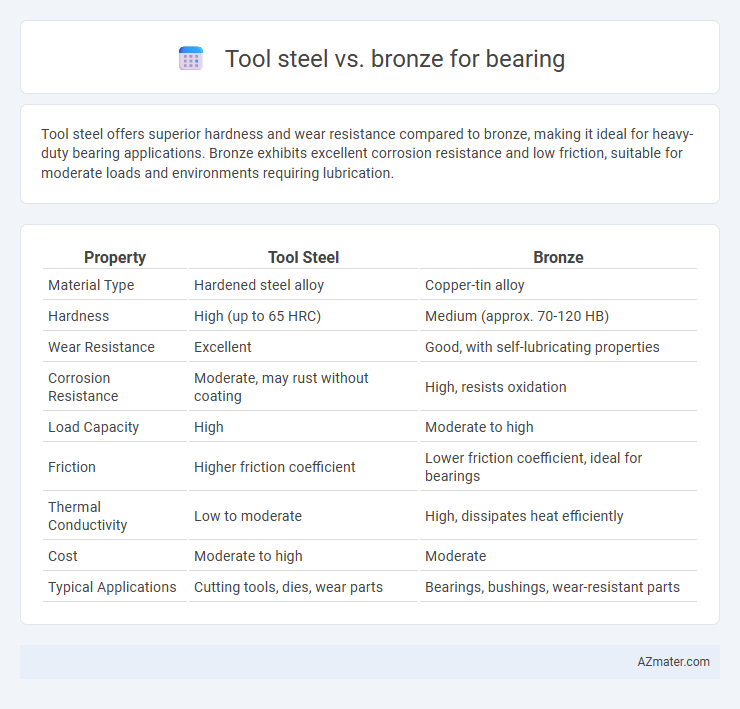Tool steel offers superior hardness and wear resistance compared to bronze, making it ideal for heavy-duty bearing applications. Bronze exhibits excellent corrosion resistance and low friction, suitable for moderate loads and environments requiring lubrication.
Table of Comparison
| Property | Tool Steel | Bronze |
|---|---|---|
| Material Type | Hardened steel alloy | Copper-tin alloy |
| Hardness | High (up to 65 HRC) | Medium (approx. 70-120 HB) |
| Wear Resistance | Excellent | Good, with self-lubricating properties |
| Corrosion Resistance | Moderate, may rust without coating | High, resists oxidation |
| Load Capacity | High | Moderate to high |
| Friction | Higher friction coefficient | Lower friction coefficient, ideal for bearings |
| Thermal Conductivity | Low to moderate | High, dissipates heat efficiently |
| Cost | Moderate to high | Moderate |
| Typical Applications | Cutting tools, dies, wear parts | Bearings, bushings, wear-resistant parts |
Introduction to Bearing Materials
Tool steel offers superior hardness and wear resistance, making it ideal for high-load bearing applications requiring durability and precision. Bronze provides excellent corrosion resistance and low friction properties, commonly used in bearings for smooth operation and longevity in wet or harsh environments. Selecting the appropriate material depends on the operational conditions, load requirements, and desired maintenance intervals of the bearing system.
Overview of Tool Steel in Bearing Applications
Tool steel in bearing applications offers exceptional hardness, wear resistance, and toughness, making it ideal for high-load and high-speed environments. Its alloy composition, typically including elements like chromium, molybdenum, and vanadium, enhances durability and fatigue resistance under extreme operational conditions. This makes tool steel a preferred choice over bronze where performance longevity and mechanical strength are critical.
Key Properties of Bronze for Bearings
Bronze exhibits excellent wear resistance, low friction coefficient, and superior corrosion resistance, making it ideal for bearing applications exposed to harsh environments. Its inherent oil-retaining capacity enhances lubrication, reducing operational wear and extending bearing life compared to harder materials like tool steel. The material's ability to withstand heavy loads and shock absorption further solidifies bronze as a preferred choice for high-performance bearing surfaces.
Wear Resistance: Tool Steel vs Bronze
Tool steel offers superior wear resistance compared to bronze due to its higher hardness and ability to maintain structural integrity under heavy loads and abrasive conditions. Bronze, while softer, provides excellent lubricity and corrosion resistance, reducing friction and wear in low to moderate load applications. In high-stress environments where durability and longevity are critical, tool steel bearings typically outperform bronze bearings by resisting deformation and surface wear more effectively.
Load Capacity and Mechanical Strength Comparison
Tool steel exhibits significantly higher load capacity and mechanical strength compared to bronze, making it better suited for heavy-duty bearing applications. The tensile strength of tool steel typically ranges from 700 to 1200 MPa, whereas bronze alloys generally offer tensile strength between 200 and 600 MPa. Tool steel's superior hardness and wear resistance contribute to its enhanced performance under high-stress conditions relative to the more ductile and corrosion-resistant properties of bronze.
Friction and Lubrication Considerations
Tool steel bearings offer high wear resistance and strength but typically require effective lubrication to minimize friction and prevent surface galling. Bronze bearings provide superior self-lubricating properties due to their porous structure and embedded lubricant reservoirs, resulting in lower friction and enhanced performance in dry or marginally lubricated conditions. Selection between tool steel and bronze hinges on operational environment, load conditions, and lubrication availability to optimize friction reduction and bearing lifespan.
Corrosion Resistance of Tool Steel and Bronze
Tool steel exhibits moderate corrosion resistance, which can be enhanced through surface treatments such as nitriding or coating, making it suitable for bearings in less corrosive environments. Bronze offers superior natural corrosion resistance due to its copper content, providing excellent performance in marine and humid conditions without requiring additional protection. For applications prone to exposure to moisture or chemicals, bronze bearings generally outperform tool steel in durability and longevity.
Cost Analysis: Tool Steel versus Bronze Bearings
Tool steel bearings typically offer higher durability and wear resistance at a lower initial material cost compared to bronze bearings, making them cost-effective for high-load applications. Bronze bearings, while more expensive upfront due to alloying elements like copper and tin, provide superior corrosion resistance and self-lubricating properties that can reduce maintenance expenses over time. The total cost of ownership favors tool steel in environments with less corrosive exposure, whereas bronze bearings justify their premium price in applications where longevity and reduced downtime are critical.
Typical Industrial Applications: Choosing the Right Material
Tool steel bearings excel in high-load and high-wear applications such as heavy machinery, automotive components, and industrial manufacturing where hardness and wear resistance are critical. Bronze bearings are preferred in applications requiring good corrosion resistance, low friction, and conformability, including marine equipment, electrical motors, and agricultural machinery. Selecting tool steel or bronze depends on operational conditions like load, speed, environmental exposure, and maintenance requirements to optimize bearing performance and longevity.
Conclusion: Selecting the Optimal Bearing Material
Tool steel offers superior hardness, wear resistance, and load-carrying capacity, making it ideal for heavy-duty bearing applications. Bronze provides excellent corrosion resistance, good conformability, and lower friction under moderate loads, suitable for applications requiring quieter and smoother operation. Selecting the optimal bearing material depends on the operational demands, environmental conditions, and maintenance requirements to balance durability and performance effectively.

Infographic: Tool steel vs Bronze for Bearing
 azmater.com
azmater.com